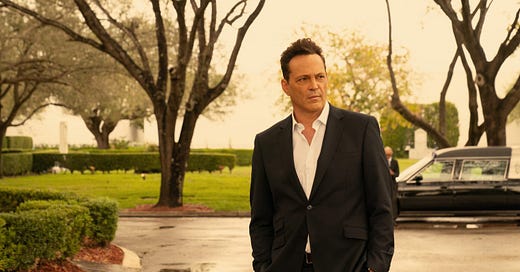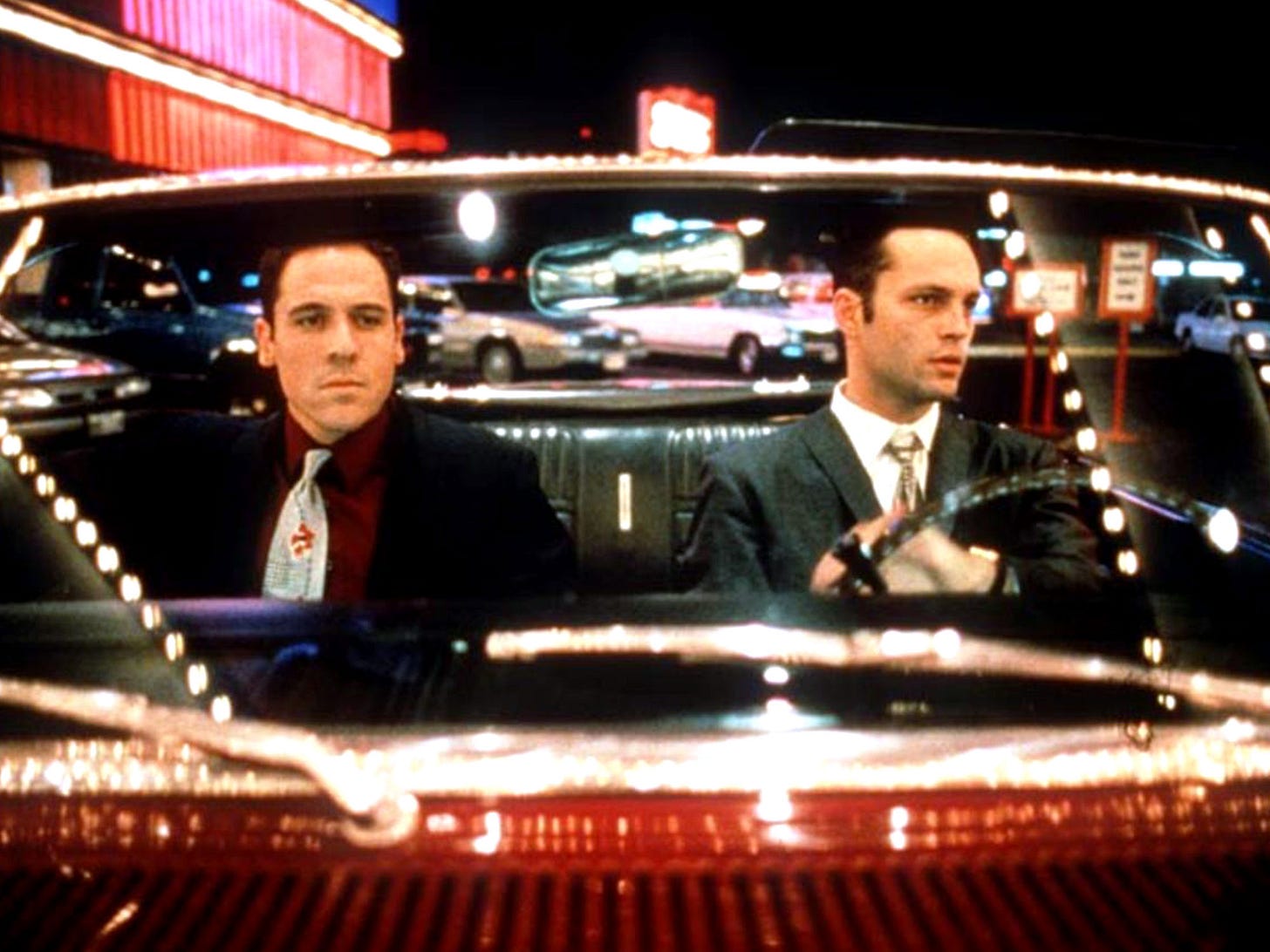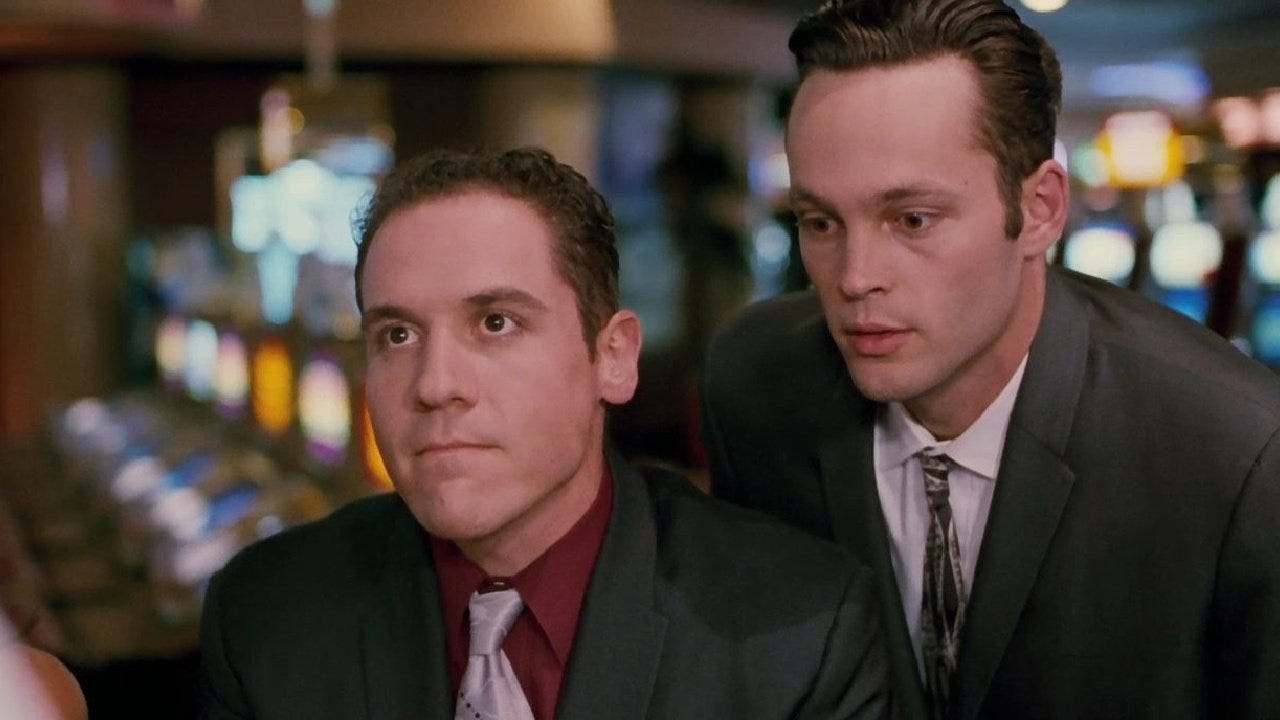Swingers, Nearly Thirty Years Later
Jon Favreau of the genesis of his debut picture with Vince Vaughn, directed by Doug LIman
The young bucks of Swingers are older now, but still working—writer-star Jon Favreau, 57; co-star Vince Vaughn, 54; and protean director Doug Liman, 59. Favreau is an emperor of the Star Wars universe, among others; Liman is still talking about shooting at least part of a movie in space, and has heist comedy The Instigators as an Apple Original Film; Vaughn is the lead in the limited series Carl Hiassen adaptation, “Bad Monkey,” also on Apple. (I wrote about things I like about “Bad Monkey” here; this was published with an embargo on episode details, so it’s as much musing about Vince Vaughn as a review of the enjoyable Apple TV+ series.)
I spoke to Vaughn and Favreau before the original release of Swingers; here’s Favreau on the genesis of the project. (The editor was Frank Sennett.)
"Like ice-cold martinis and filterless Camels, Swingers... is a story told in the language of the cocktail nation, a ninties retro-Swing movement that's beginning to sweep the country... The clubs are jamming and it's time to swing," wrote the anonymous hack behind the movie's Miramax press notes in 1996.
Ee-yew. With that promotion, I was prepared to despise the movie, even with some knowledge of the Chicago and Los Angeles backgrounds of writer-star Jon Favreau and co-star Vince Vaughn. (Favreau even worked for a time in the role of dishwasher at The Second City, hoping to someday hit the Mainstage.)
I was ready to take on the ashes and even the sackcloth of the Reader's Barbara Scharres, who advised barf bags, or the Village Voice's Amy Taubin, who wrote, Hey I'm a woman, of course I'm excluded.
The first few minutes are unpromising. Oh-oh—Hollywood lowlifes, actor wannabes angling toward remunerative mediocrity, then their dating woes, their feeble foibles, their maudlin selfish, self-regarding boy-patter. Jeez, cockroaches, I thought. It's narrow turf, minuscule turf. I even have friends who have frequented the onscreen bars and clubs, and several are actors who haven't "made it," but have made Bud Bowl and MCI and Head & Shoulders commercials, fallen into episodic cameos, got known as "recurrent characters" making a clean, anonymous living while being known for nothing.
Then, in their downtime, they go to places like the Dresden Room and the Hollywood Hills Diner and develop their own comic shorthand as they fret over what skills they may or may not have, as actors, as social animals, as little Joseph Campbell apothegms with unsated appetites and egos that cry out for a baby-sized mommy hug. (And yes, they're kicking themselves for not having written this script first.)
Then Favreau's lark makes little shifts, capably turning into a straightforward comedy from the male side of contemporary dating, not a hipster movie at all. Despite the characters' flip, post-Rat Pack patois, Swingers is less about hip and cutting-edge than bored and killing time. It's a scrupulously detailed sociological treatise.
Favreau's Mike, a stand-up whose every aside withers into painful silence, more Charles Grodin than Woody Allen, suffers through enough self-humiliation, by movie's end, that his character would have to become a better person or kill himself. (The man lives.)
Favreau hits the "swing scene" note, hard, in our two conversations, but I don't buy it. Swingers is a delicate little scalpel job, slivering away at sorry sadisms and masochisms in a microcosm of dating rituals. They're boys being boys, indeed, but boys doing more damage to themselves than anything else. What a simple Hollywood paradigm—one grows up, one doesn't.
They're not Linklater-like slackers, pondering larger thoughts, they're guys who get their tans shuttling from numbing audition to audition, intoxicated by the beauty and promise of that sorry, mottled landscape, L. A.'s demi-Mediterranean cornucopia of desire and fulfillment, of self-delusion and scumbag lies.
One of our meetings was at the long-gone Salt & Pepper diner at Lincoln and Wrightwood in Chicago, slouched in a booth along with two confident talkers.
Meeting the thirty-year-old Favreau and the twenty-six-year-old Vaughn, Vaughn is the flesh-and-blood edition of Trent, the run-at-the-mouth, talking-in-tongues, living-on-adrenaline character he plays. It's no wonder that after Steven Spielberg was sent a copy of the picture to clear the rights to a gag with the Jaws theme, Spielberg cast Vaughn as the counterpart to Jeff Goldblum in the sequel to Jurassic Park.
Favreau, on the other hand, gleams with self-confidence, unlike the pie-eyed Mike, who no longer wants to be a loser, pining for a girlfriend who dumped him a year before.
The odyssey of Swingers going from unsold script to prefab buzz would be enough to give most screenwriters that extra jolt of confidence.
"It all snowballed. It wasn't any kind of crusade to take over or take on Hollywood," Favreau tells me. "It started off with me sitting at my computer with a new program. Just writing."
Favreau had completed a small role in Rudy a few months earlier, but his type had changed. "I wasn't working much as an actor. I lost a lot of weight, like seventy-five pounds, and it was tough getting a job. So I wrote a writing sample. Write what you know, right? So I did. I knew my block. I knew my friends. I knew the bars I went to and the restaurants I went to. It's completely fictitious. People see how similar it is my life and my friend's lives and they assume it's all true. But it's fabricated. All the events. Conversations echoed conversation, but that's not me up there."
Favreau printed out the script and passed it around. "I showed it to my friends, they got a kick out of it, I showed it to my agent, he got a kick out of it. We went out with it, people wanted to make it. Then I sat in those story meetings and they wanted to change everything. Putting it completely in Vegas, not putting Vegas in at all, putting women in, no women at all. Make this guy more likable. you write your first screenplay, you assume everybody knows more than you. You look at the notes, you want to make everyone happy and you realize it's all conflicting. It's arbitrary. Arbitrary. The only thing people will ever agree on is how many pages long something should be. They flip to the last page, 'Hmm. 103 pages. That's good. 120? Ooh. Needs a rewrite.' It's a whole industry of well-paid people who do this."
"Once you take a step back and sacrifice something, once you close one door… You better rush through the next one with even more verve or otherwise you just look like this poor schmuck who blew an opportunity."
Favreau didn't want to rewrite the script, so he and his friends decided to stage readings. "I figured, they'd hear it, I wouldn't have to rewrite it. Not only would it show that it was a funny script, but it would give my friends a chance to be auditioning for these roles for an hour-and-a half that they were perfect for. The reading went so well, my agent encouraged me to pull the script away from the studios."
Eighteen months of salesmanship followed. "Once you take a step back and sacrifice something, once you close one door," Favreau says, "You better rush through the next one with even more verve or otherwise you just look like this poor schmuck who blew an opportunity."
Even when there's no door? "Right," he says, laughing. "There was no door! I was smashing my head into the wall for the next year-and-a-half. But we did readings for prospective investors all that time, with me attached to direct, the same actors, the same producers. It was all very professional. Everybody loved it, the readings were hilarious, same people, funny as the film from day one. We were like the touring company of Swingers! But no one would do it. We did budgets for $2 million, a million-and-a-half.
“But by this time I was so committed to this crusade, that when Doug Liman came in and said he could shoot the script as written for $250,000, using my cast, it really scared me, but it was the only way to get the movie made. I gave up directing, but I got to keep my cast and edit the film and get all the locations I had written into the script. We went right into preproduction and made it then! We were ready. A month to set up, boom-boom-boom, three weeks to shoot and then we were editing it.
“We blew Sundance's deadline, but that turned out just fine—that rainy night we had a screening in L. A. for the cast and crew and distributors, it sold.
“That was that. And here we are."





